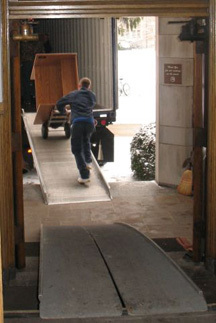
Plenty of heavy lifting took place at the Notre Dame Law School in December and the first week of January.
Much of it involved moving new furniture and equipment into the Eck Hall of Law, an 85,000-square-foot building that is the new home to most of the school’s faculty, students and staff.
But there also was the matter of moving the old furnishings out of the Law School’s previous facility to make way for renovation, and, as importantly, then deciding what to do with them.
When University-owned furnishings and other materials no longer are needed by various departments, they usually are sent to NDSurplus, a campus service that reallocates the property to other departments or sells it at reduced costs to local individuals and non-profit organizations.
In the case of the Law School, NDSurplus had enough space in its facility for about half of the property from the old building, which left Julie Boynton, the University’s senior project manager for interiors, with the challenge of finding a home for the remainder.
In the past, most organizations facing this kind of dilemma would simply dump the material into trucks and haul it off to a landfill. But Notre Dame’s commitment to sustainability caused Boynton to consider alternatives.
“Sending this material to a landfill simply wasn’t an option,”she said.
One of her strategies was to contact various furniture vendors with whom she works to ask if they had any ideas.
Mark Macheca, the owner of Business Furnishings in South Bend, told Boynton about the Environmental Partnership Program, a collaboration of the global office furnishings manufacturer Steelcase and the Institution Recycling Network (IRN) that matches previously owned office furniture with non-profit organizations around the globe.
“Furniture that is no longer needed by one organization can provide tremendous value to another,”said Nancy Hickey, senior vice president and chief administrative officer for Steelcase.“We have found that there is limitless demand for the furniture that is discarded every day. We want to not only help organizations responsibly and effectively manage their unused furniture, but extend the life of that furniture into other businesses and communities that need it.”
IRN was eager to accept the recycled Law School furniture and equipment ñ which included some 1,600 items such as desks, chairs, tables, bookcases and lamps ñ and contacted Food For The Poor, one of the non-profit groups worldwide with which it works, for recommendations on where to send the property.
Food For The Poor representatives arranged for about 400 pieces to go to the College of Notre Dame de Perpetuel Secours, a primary and secondary Catholic school in Cap-Haitien, Haiti. The school, which was established in 1904, is a ministry of the Congregation of Holy Cross, the University of Notre Dame’s founding religious community, but is not otherwise affiliated with the University. Most of the remainder of the furnishings will be used by Food For The Poor’s ministry in Jamaica.
Once IRN loaded the furnishings into eight large ocean shipping containers, they were transported to Chicago, and then will be sent by rail to Houston and by ship to the Caribbean.
The innovative recycling of the Law School property has turned into a win-win-win solution: The furniture isn’t going to a landfill, Food For The Poor and the school in Haiti are receiving at no cost much needed furnishings, and the project actually saved Notre Dame money. It cost $14,000 to have IRN recycle the furniture, but would have cost around $20,000 to send it all to a landfill (not to mention the untold cost to the environment).
IRN was established in 1999 and is based in Concord, N.H. It is a cooperative organization that works with more than 125 colleges and universities, hospitals, private firms, public and private schools, and state agencies to improve the performance and economics of their recycling programs. IRN negotiates for transportation, processing and marketing of recycled commodities using the collective strength of its member institutions, and provides a single point of contact to recycle dozens of different materials ñ everything from cardboard and fluorescent lamps to concrete and Astroturf. More information is available at www.ir-network.com .
The Steelcase Environmental Partnership Program was established in 2004 and is the first in its industry to help businesses determine and implement the best way to recycle furniture. Through this program, organizations can extend the useful life of their furniture in several potential ways:refurbishing the furniture; selling or donating the furniture to another organization; or recycling the furniture, with the goal of minimizing the amount put in a landfill.
The Eck Hall of Law is named in honor of the late Frank Eck, a 1944 Notre Dame graduate who provided a $21 million gift to help underwrite the building’s construction. A covered archway that house a commons area connects Eck Hall to the older building, which will be renamed Biolchini Hall in honor of Robert and Frances Biolochini, who made a $15 million gift to help underwrite renovation.
Eck Hall houses the Law School’s classrooms, offices, moot courtroom, seminar rooms, computer laboratory, chapel and other facilities. Upon completion, most of the renovated Biolchini Hall will be home to an expanded Kresge Law Library.
_ Contact: Julie Boynton, 574-631-4201 or_ " Boynton.3@nd.edu ":mailto:Boynton.3@nd.edu
TopicID: 31087